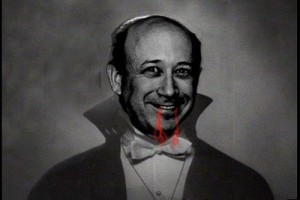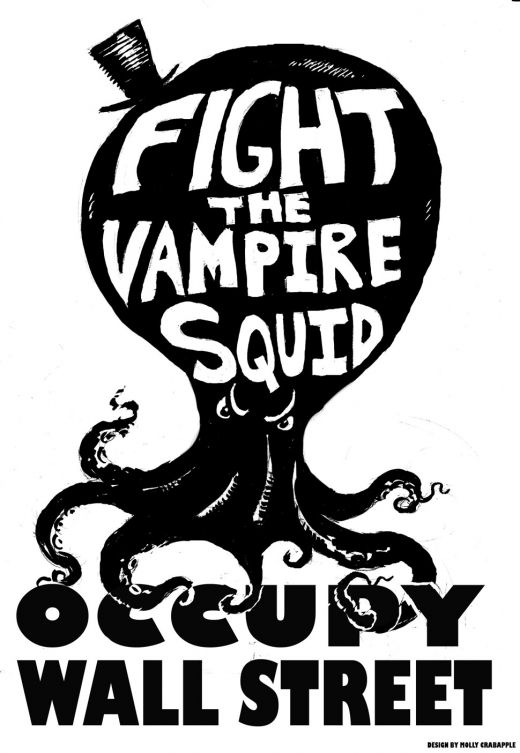THE ATLANTIC: Calling the environment he works in “toxic and destructive,” an executive director of Goldman Sachs announced he’s quitting the firm today because he can no longer stomach what his beloved company has become. And just to make sure he drives the point home to his bosses, his resignation letter is now on the Opinion Page of Wednesday’s edition of The New York Times. Greg Smith, whose former job description is listed as “executive director and head of the firm’s United States equity derivatives business in Europe, the Middle East and Africa,” summed up his feelings rather succinctly in the opening paragraphs:
To put the problem in the simplest terms, the interests of the client continue to be sidelined in the way the firm operates and thinks about making money. Goldman Sachs is one of the world’s largest and most important investment banks and it is too integral to global finance to continue to act this way. The firm has veered so far from the place I joined right out of college that I can no longer in good conscience say that I identify with what it stands for.
Smith goes on to place the blame squarely on CEO Lloyd Blankfein [pictured, below right, in cape] and president Gary Cohn, for letting firm’s “moral fiber” deteriorate on their watch. Instead of “teamwork, integrity, a spirit of humility, and always doing right by our clients,” he says that making money has become the driving force of all of Goldman’s decisions (especially promotions), usually at the expense of the client’s best interests. MORE
NEW YORK TIMES: How did we get here? The firm changed the way it thought about leadership. Leadership used to be about ideas, setting an example and doing  the right thing. Today, if you make enough money for the firm (and are not currently an ax murderer) you will be promoted into a position of influence. What are three quick ways to become a leader? a) Execute on the firm’s “axes,” which is Goldman-speak for persuading your clients to invest in the stocks or other products that we are trying to get rid of because they are not seen as having a lot of potential profit. b) “Hunt Elephants.” In English: get your clients — some of whom are sophisticated, and some of whom aren’t — to trade whatever will bring the biggest profit to Goldman. Call me old-fashioned, but I don’t like selling my clients a product that is wrong for them. c) Find yourself sitting in a seat where your job is to trade any illiquid, opaque product with a three-letter acronym. Today, many of these leaders display a Goldman Sachs culture quotient of exactly zero percent. I attend derivatives sales meetings where not one single minute is spent asking questions about how we can help clients. It’s purely about how we can make the most possible money off of them. If you were an alien from Mars and sat in on one of these meetings, you would believe that a client’s success or progress was not part of the thought process at all. It makes me ill how callously people talk about ripping their clients off. MORE
the right thing. Today, if you make enough money for the firm (and are not currently an ax murderer) you will be promoted into a position of influence. What are three quick ways to become a leader? a) Execute on the firm’s “axes,” which is Goldman-speak for persuading your clients to invest in the stocks or other products that we are trying to get rid of because they are not seen as having a lot of potential profit. b) “Hunt Elephants.” In English: get your clients — some of whom are sophisticated, and some of whom aren’t — to trade whatever will bring the biggest profit to Goldman. Call me old-fashioned, but I don’t like selling my clients a product that is wrong for them. c) Find yourself sitting in a seat where your job is to trade any illiquid, opaque product with a three-letter acronym. Today, many of these leaders display a Goldman Sachs culture quotient of exactly zero percent. I attend derivatives sales meetings where not one single minute is spent asking questions about how we can help clients. It’s purely about how we can make the most possible money off of them. If you were an alien from Mars and sat in on one of these meetings, you would believe that a client’s success or progress was not part of the thought process at all. It makes me ill how callously people talk about ripping their clients off. MORE
MARKET WATCH: As of late Wednesday afternoon, the op-ed had about 3 million page views, Times spokeswoman Eileen Murphy told me by email. Murphy added: “It’s the most heavily trafficked story on the site. The second story in terms of traffic is the business section story about the resignation. That story has over a half million page views, as of the same time period.” Think about it. Smith’s first-person broadside attack received about six times as many page views as the news account of it. Clearly people ate up the red meat that Smith served. In his attack, the former Goldman official alleged that the prestigious securities firm stressed profits to extreme levels. He said Goldman’s bankers labeled clients in a derogatory manner, as “muppets.” Ultimately, he points a finger at Lloyd Blankfein, Goldman’s CEO, and his leading lieutenant, Gary Cohn. MORE
 POLITICO: Jake Siewert, former counselor to Treasury Secretary Timothy Geithner and press secretary at the end of the second Clinton administration, has landed at Goldman Sachs, where he will be a managing director and head of global corporate communications. Siewert is expected to inherit the portfolio of Lucas van Praag, a long-time Goldman executive who ran the public relations department and developed a reputation for his sharp wit and barbed emails to reporters he believed had misrepresented the bank. Van Praag is expected to leave within weeks. Siewert will undoubtedly take some criticism for taking part in the “revolving door” between Washington and Wall Street. Several senior White House officials, including current Chief of Staff Jack Lew and former Chief of Staff Bill Daley joined the White House from big banks — Citigroup and JPMorganChase respectively. MORE
POLITICO: Jake Siewert, former counselor to Treasury Secretary Timothy Geithner and press secretary at the end of the second Clinton administration, has landed at Goldman Sachs, where he will be a managing director and head of global corporate communications. Siewert is expected to inherit the portfolio of Lucas van Praag, a long-time Goldman executive who ran the public relations department and developed a reputation for his sharp wit and barbed emails to reporters he believed had misrepresented the bank. Van Praag is expected to leave within weeks. Siewert will undoubtedly take some criticism for taking part in the “revolving door” between Washington and Wall Street. Several senior White House officials, including current Chief of Staff Jack Lew and former Chief of Staff Bill Daley joined the White House from big banks — Citigroup and JPMorganChase respectively. MORE
Don’t miss the Vampire Squids in Armani suits swarming the subdivisions of suburbia for new victims at the 1:00 mark.

